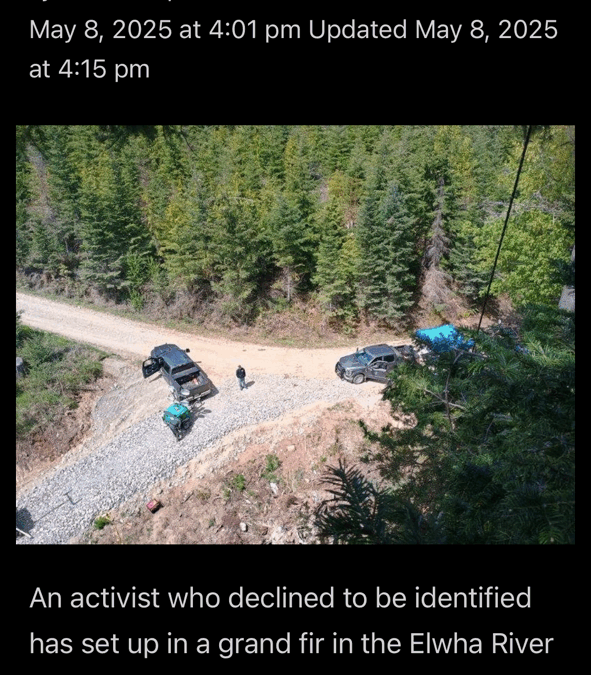“ An activist who declined to be identified has set up in a grand fir in the Elwha River watershed to stop cutting of the forest in the state’s Parched timber sale.
An activist has spent the last couple nights perched on a chilly, wind-rocked platform in a grand fir near the Elwha River, in the latest flare-up in the escalating conflict over logging of older state forests.
The tree sit, or protest carried out in a tree set to be cut for timber, and an accompanying blockade of a logging road has attracted the attention of law enforcement. A rally that could draw more demonstrators is planned for the afternoon Thursday at the logging road gate on Walkabout Way about 2 miles from town in Port Angeles.
Demands of the protest include immediate cancellation of this cut, called the Parched timber sale; a pause on all logging in the Elwha watershed; and a permanent ban on logging the remaining mature forest on state lands in Western Washington.
Multiple lawsuits are pending over the sale, which is temporarily blocked by an order from the Clallam County Superior Court.
Commissioner of Public Lands Dave Upthegrove issued a statement Thursday criticizing the sit: “This stunt is dangerous, reckless and counterproductive. Their actions put the safety and lives of my employees at risk — and I will seek the prosecution of those involved to the fullest extent of the law. This kind of dangerous vandalism makes it harder to advance a positive environmental agenda.”
The auction of the Parched timber sale to the Murphy Company was approved by the Washington State Board of Natural Resources last December.
The sale contains lots of towering old growth, which was set aside per state policy. But much of the rest of it is scheduled to be cut. These older trees — not old growth, but bigger, older, strong, high-quality timber — is just what the family-owned, Oregon-based Murphy Company, needs for its products.
Wood from Washington’s state forests keep their workers working, including at a plywood mill in Elma, Grays Harbor County, and provides products people want and need. Logging on these state trust lands also pays for local government services.
But as more trees fall and climate change challenges the health of forests — and the rivers those forests protect — logging in the Elwha has been particularly controversial.
It was there that Congress spent more than $350 million to take down two hydropower dams to revive legendary fish runs in the Elwha — a recovery that is just beginning to take hold more than a decade after the last dam came down.
Logging can increase sediment in streams. Cutting the canopy can raise stream temperatures. Cutting mature forests and replanting with young trees depletes stream flows and the effect lasts for decades. All of these things have happened on the Olympic Peninsula for many years, stressing salmon and steelhead populations.
And so the tree-sit activist, 25, decided to take action. (They declined to share their identity for “legal reasons,” they said.)
They are solo atop a platform some 80 feet up in the air, which is secured to a blockade of cement anchors and wood debris on the logging road. Remove the blockade, and they fall to the ground.
They have been up there two nights so far.
Determined to remain, they said by cellphone from the sit that the Elwha needs protection.
“I love this area and love the watershed, and I feel really compelled to protect it,” they said. It’s been cold and windy ever since they arrived. With a composting toilet, plenty of food and even a watercolor paint set, they are set up for the long haul.
DNR says it’s patrolling the area 24 hours a day and has lights on overnight at the site. Joe Smillie, spokesman for DNR, said the platform is rigged to topple if the blockade is disturbed. “We decided to block the whole area off for everyone’s safety,” he said.
Attorney Elizabeth Dunne of the Earth Law Center, which is representing opponents of the sale, said the suits consider the forest as an interconnected whole, protecting salmon, and in turn, the southern resident orcas that feed on salmon.
“Our lawsuit mirrors that interconnectivity,” Dunne said, “and it challenges the lack of recognition by state agencies of logging impacts the entire ecosystem in particular streamflows.”
Members of the Lower Elwha Klallam tribe and the Port Angeles community also have signed a petition against logging in the watershed.
Lands Commissioner Upthegrove campaigned against continued logging of older forests on state lands. On his first day in office earlier this year, he put a temporary pause on further auctions of old and mature forests, while the department crafts a revised policy for older forests.

